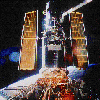Space Telescopes

| H. E. Smith | Winter 1999 |

| Physics 7 - Lecture Summary #4
(cont'd) Space Telescopes |  |

There are three fundamental reasons for putting telescopes into space:
To these we must add the Solar System Exploration Spacecraft which visit the planets and other solar system bodies and make direct sensing measurements of the conditions and future interferometry missions which will place satellites in distant orbits to provide extremely long baselines, synthesizing telescopes much larger than the earth and thereby achieving very high resolving power.
HST's Orbit Where is it right now?
X-Ray
Observatories and the history of x-ray astronomy.

![]() Thermal Radiation
Thermal Radiation
![]() Radio Telescopes
Radio Telescopes
![]() Physics 7 Lectures
Physics 7 Lectures
![]() Physics 7 Home
Physics 7 Home
Conducted by Gene Smith, CASS/UCSD.
Comments?
You may send email to hsmith@ucsd.edu
Prof. H. E. (Gene) Smith
CASS 0424 UCSD
9500 Gilman Drive
La Jolla, CA 92093-0424
Last
updated: 21 April 1999